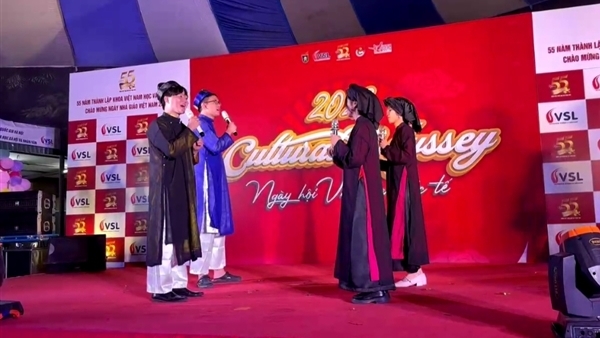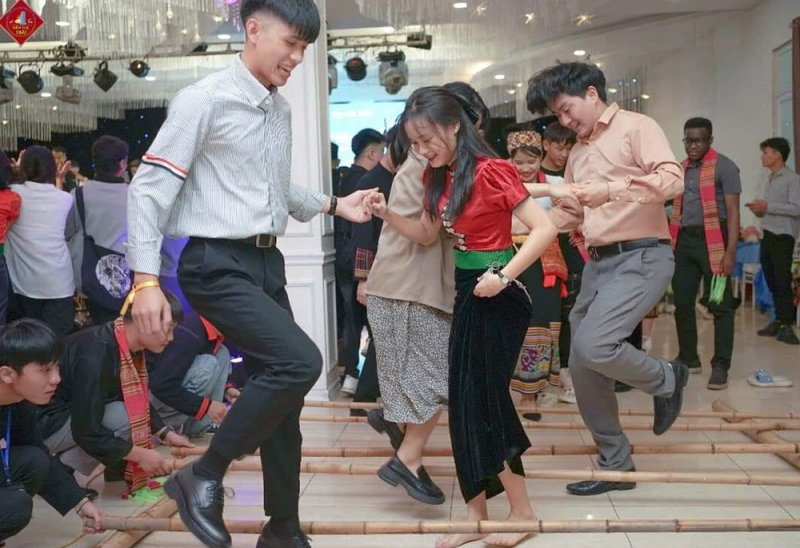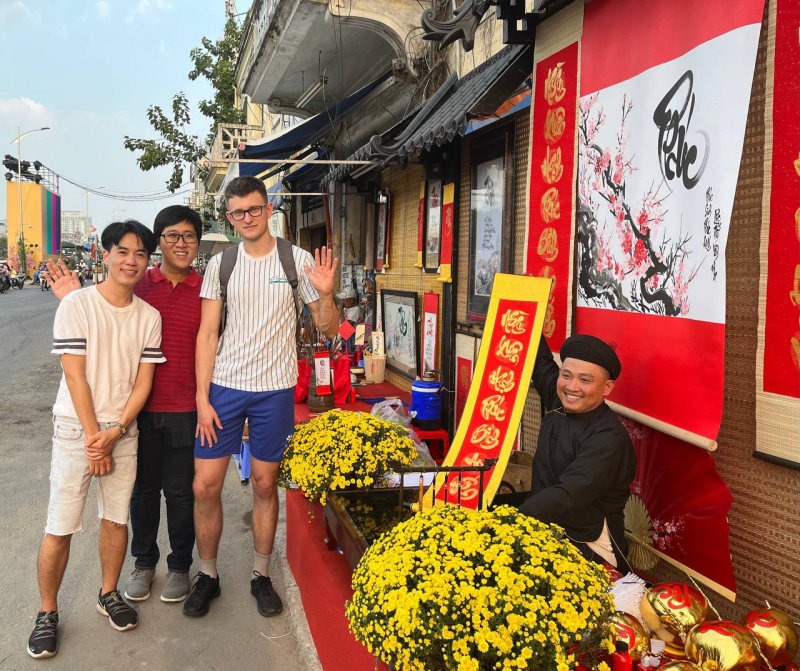The charming Japanese boy performing the Xoan folk song.
Hanoi welcomes Tet (Vietnamese Lunar New Year) with cold winds and light rain, but the winter chill doesn't seem to diminish the warmth and vibrancy at the International Cultural Festival organized by the Faculty of Vietnamese Studies and Vietnamese Language, University of Social Sciences and Humanities (Vietnam National University, Hanoi). Almost every year, the Faculty of Vietnamese Studies and Vietnamese Language organizes this festival so that foreign students studying here can celebrate the Vietnamese New Year and experience the cultural spaces of many countries around the world. Coming here, I always feel like I'm "traveling" to many countries around the world…

Japanese student Okabe Chikara (far left) and his fellow students gracefully perform the Xoan folk song.
It was delightful to sample potato cakes, mushroom spring rolls, apple pie, and radish soup from Polish students; kimchi fried rice from Korean students; tomato sauce pasta from American students; and papaya salad from Laotian students. Each dish had its own unique flavor, offering a delightful culinary experience. Among these delicious, unique, and exotic dishes, I was particularly impressed with the water droplet cake, a traditional Japanese dessert. The creator of this unique cake is Okabe Chikara, a Japanese student.
Okabe Chikara excitedly told me that her teardrop-shaped cakes were so "eye-catching" to Vietnamese students that she sold out all the cakes she had made within an hour. "I not only sold the cakes but also introduced the cultural value of Japanese cakes. Everyone listened with great enthusiasm, and that made me happy!" Okabe Chikara shared.
While I was still amazed by the Japanese boy's perfect Vietnamese pronunciation, Okabe Chikara took to the stage with a Vietnamese student and two Chinese students to perform a Xoan folk song from Phu Tho, a precious intangible cultural heritage of the ancestral land, to resounding applause from the visitors attending the Cultural Festival.
Oh my, a Japanese boy singing Xoan folk songs so sweetly and charmingly, truly like an artist from the ancestral land. The feeling when Okabe Chikara sang was that he let his soul sink deep into the melody, his heart throbbing with the gentle music. If the organizers hadn't introduced him as a Japanese boy, we would have thought Okabe Chikara was a Vietnamese student… After his unique Xoan performance, I chatted with Okabe Chikara. He told me that he has been in Vietnam for six years and has celebrated Tet (Vietnamese New Year) in Vietnam many times.
“Vietnamese and Japanese people share many similar customs during Tet (Vietnamese New Year), such as giving gifts and lucky money to each other. The Japanese also have certain taboos, such as arguing on the first day of Tet, believing it will bring bad luck for the whole year; and that during Tet, one should only smile and be happy to bring joy to everyone. These cultural similarities make me feel like Vietnam is my homeland, and it also eases my homesickness!” Okabe Chikara expressed. This Japanese young man has a special love for Vietnam (Okabe Chikara even told me he has a Vietnamese girlfriend), and he deeply loves the Vietnamese language, so he understands Vietnamese Tet culture on a very profound level. Okabe Chikara especially enjoys the feeling of the first days of spring, going to Hang Ma Street to admire the sparkling decorations, or visiting Vietnamese friends and teachers.

Japanese student Okabe Chikara was fascinated by the Vietnamese bamboo pole dance.
“I really love banh chung (Vietnamese sticky rice cake), sister. I even know the legend behind banh chung and banh day (another type of Vietnamese sticky rice cake). When I eat banh chung, I always remember a legend that expresses the Vietnamese people's wish for fertility, growth, and prosperity. I will learn how to wrap banh chung so that I can wrap it myself during Tet to offer to my teachers and friends,” Okabe Chikara confided. However, what impressed Okabe Chikara most about Tet in Vietnam was going to Hoan Kiem Lake to admire the Turtle Tower. In Okabe Chikara's eyes, the Turtle Tower is strangely simple and peaceful when its reflection is cast upon the emerald green lake. The Japanese boy can stand for hours, immersed in the beauty of the Turtle Tower without getting bored.
Cultural bridges bringing Vietnamese Tet to the world.
Like Okabe Chikara, many other foreign students studying in Vietnam also love the Vietnamese Lunar New Year, including Artem Leleka, a Ukrainian student.

Ukrainian student Artem Leleka and his friends learn about calligraphy culture during the Vietnamese Lunar New Year.
Among the foreign languages in Asia, Artem Leleka chose Vietnamese because, in addition to his affection for Vietnam, he recognized the country's rapidly developing market, promising him many future opportunities. Furthermore, choosing to study Vietnamese gave him the chance to receive a scholarship and free tuition at Taras Shevchenko University in Kyiv… Artem Leleka says that Vietnamese Tet (Lunar New Year) is very special because it marks the beginning of joy and a warm atmosphere. All Vietnamese people return to their hometowns for Tet and gather with their families and relatives. Artem Leleka cherishes this tradition because he understands the importance of family bonding. Tet is also an opportunity for people to set aside worries, be more tolerant, and strive for better things.
Recalling his Vietnamese Tet (Lunar New Year), Artem Leleka said: “My first Tet in Vietnam was in Ho Chi Minh City; a Vietnamese friend invited me to visit their home and we celebrated Tet there. Ho Chi Minh City was ablaze with flower-filled streets, everywhere was beautifully decorated, and the Vietnamese people celebrate Tet in such an elaborate way, rich in cultural identity. I was captivated by the streets ablaze with golden apricot blossoms.” In Ho Chi Minh City, Artem Leleka also watched lion and dragon dances, and the Ukrainian student believes that the uniqueness and diversity of Vietnamese culture are strongly expressed through these dance forms. Afterwards, Artem Leleka explored many interesting tourist destinations such as Ben Tre Island surrounded by rivers, the Ho Chi Minh City History Museum, and Nguyen Van Binh book street.
Like Okabe Chikara, the Ukrainian student particularly enjoys green sticky rice cakes (bánh chưng). “I still remember the first time my Vietnamese teacher gave us sticky rice cakes. The aroma of sticky rice and banana leaves, combined with the rich flavor of meat and beans, was incredibly delicious, bringing back warm memories of Vietnamese Tet,” said Artem Leleka.
When I asked about New Year's in Ukraine, Artem Leleka said that in his homeland there is no New Year's Day, but there are New Year's Day and Christmas. Ukrainians also gather together to celebrate the New Year at midnight. Giant Christmas trees are erected in every city and countryside, and a concert is held to welcome the New Year. On Christmas Eve, families gather together because this is an important Orthodox religious holiday in Ukraine. Artem Leleka also mentioned that on Christmas Day, Ukrainians cook 12 traditional dishes symbolizing the 12 apostles…
According to the Ministry of Education and Training, there are currently about 22,000 foreign students studying at 160 educational institutions in Vietnam. Many of the foreign students I spoke with said they had "fallen in love" with the Vietnamese Tet (Lunar New Year). They love the natural scenery, the unique customs of the Vietnamese people, the beautiful New Year traditions that are preserved; they love the image of Vietnamese people working hard all year to save up for Tet; they love the way everyone is busy preparing for the important rituals of Tet. Having felt the depth of Vietnamese culture, these foreign students have become a bridge connecting Vietnamese culture to the world, spreading the traditional cultural values of the Vietnamese Tet to international friends…
Currently, the University of Social Sciences and Humanities (VNU-USSH) has nearly 1,000 international students from many countries, including China, South Korea, Japan, Thailand, Laos, Cambodia, Russia, the United States, the United Kingdom, and Germany, who are studying, interacting, and exchanging ideas. At VNU-USSH, students not only learn Vietnamese and enhance their professional knowledge in their favorite fields, but also get to explore, experience, and immerse themselves in the rich cultural and artistic life of Vietnam.
Author:Thu Phuong (People's Police Newspaper Online)
Newer news
Older news